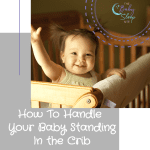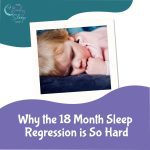
Baby sleep regressions occur at many ages, usually around 6 weeks, 4 months, 8 to 9 months, 15 months, 18 months, and 2 years old. It’s a phrase you probably didn’t know existed before you had a baby, but now? Now that your baby is waking frequently, and you are exhausted beyond all reason? Now that your toddler is waging a fierce anti-nap campaign? “Sleep regression” is probably a phrase you’re familiar with! Learn more about sleep regressions based on my 15+ years as a baby sleep consultant.
What is a Sleep Regression?
A sleep regression describes a time (~3 to 6 weeks) when a baby or toddler who has been sleeping well suddenly starts waking at night, taking short naps, or skipping naps for no apparent reason. Parents often describe being caught totally off guard. You think you have conquered all your baby’s sleep challenges when suddenly, you’re back to constant night wakings and nonexistent naps. Frustrating, to say the least!!
How Long Do Sleep Regressions Last?
Most sleep regressions last 3 to 6 weeks, on average. Some days and nights might be better than others. Most babies will return to their normal sleeping patterns after a sleep regression unless you create new habits to break (or bring back old ones), of course!
Sleep Regression Signs
Sleep regression signs include babies frequently waking at night, taking short naps, fussiness, and sometimes a peak of separation anxiety. In addition, most sleep regressions occur during periods of rapid developmental leaps. Of course, sometimes it’s hard to know if it’s a sleep regression, phase, or habit that has formed!
Sleep Regression Ages: When (And Why) They Happen
Remember, every baby is different, so what is true for your friends’ babies may not necessarily be true for yours. That is, your baby or toddler may show true regression signs at some of these month markers, but not others.
That said, there are some ages during which most babies or toddlers go through a regression that affects their sleep:
6 Week Sleep Regression? Or, Growth Spurt?
6-week olds seem to really start to ‘wake up’ if they weren’t alert from birth. If your 6-week old baby is suddenly struggling with sleeping, you might be exhausted. Babies this age actually have a peak of fussiness and a growth spurt.
Learn more about your 6-week old here:
3-4 Month Sleep Regression
This regression is permanent, parents! That is to say that the changes that happen with the 4 month sleep regression are permanent changes. By 4 months, your baby has ditched her babyish sleeping patterns and is sleeping more like an adult. That translates into frequent night waking (and lots of fussing) along with shortened naps.
Find 3-4 month sleep regression help here:
6 Month Sleep Regression? Or, a Growth Spurt?
In my 15+ years of experience as a sleep consultant and working with thousands of families over the years, there isn’t a 6-month sleep regression. Some 6-month-olds do have sleep problems around this age, but there isn’t a 3 to 6-week period with chronic sleep problems like the other regressions listed on this page. Sleep regressions happen at many ages but not this one.
Learn what’s really happening at 6-months old here:
8 Month Sleep Regression
The 8 month sleep regression is all thanks to the developmental milestones that are happening around 8 months, 9 months, and 10 months. At this stage, most babies are making great strides physically. They’re learning to crawl, pull up, cruise, etc. There’s also a lot of brain development happening at this stage. Your baby is absorbing language like crazy!
Finally, most babies are cutting at least a few teeth during this season. Add it all up, and you get more night waking, shorter (or even skipped) naps, and one cranky baby on your hands.
Sign Up on our Mailing List and Download Your FREE Guide: 5 Ways to Help Your Child Sleep Through the Night
Join over 500,000 parents around the world over the past 15 years and sign up today to receive this free guide with 5 TEAR-FREE ways to help your child sleep better and our Baby Sleep Newsletter absolutely FREE!
We will NEVER share your information with third parties!
9 Month Sleep Regression
The 9 month old sleep regression is really just a continuation of the one at 8 months. However, some babies don’t start this sleep regression until they turn 9 months old. There is nothing wrong with your baby if sleep was fine at 8 months old but not at 9 months old.
10 Month Sleep Regression
Just like the 9-month sleep regression, the 10-month sleep regression is really just the culmination of the regression at 8 or 9 months, depending on when your baby started this phase. The entire sleep regression lasts 3 to 6 weeks, on average, and some days/weeks will simply be better than others. The main difference with 10-month-olds is that many of them can stand up in their beds, which can complicate matters.
Find 8, 9, and 10 month sleep regression help here:
11 Month Sleep Regression
The 11-month nap regression doesn’t seem to affect as many of our clients as the other regressions do. It seems to be a less common one.
At any rate, this regression has a lot to do with naps. Specifically, you might find that your baby suddenly starts refusing their second nap, and tries to get by with just one nap.
Lots of parents assume that this is a normal nap transition and that it means their little one is ready for just one nap a day.
However, we urge parents to treat this one as the temporary speedbump it most likely is instead. Most toddlers really aren’t ready to transition to just one nap a day until about 15-18 months old, on average.
Toddler Sleep Regressions
Unfortunately, sleep regressions don’t stop when your baby turns one. Toddlers have sleep regressions, too.
12 Month Regression
The 12 month sleep regression is really the same as the 11 month regression. If your toddler starts this one in the 12th month, it’s possible they will actually transition to just one nap early. Still, it’s better to be prudent and treat it as a phase for a few weeks to make sure.
Find 11 month or 12 month sleep regression help here:
15 Month Sleep Problems
At 15 months old, your child may be learning to walk and that could cause some disruption in sleep. But, generally speaking, if your 15-month old suddenly starts having some trouble sleeping, most likely, they are starting to transition to one nap. This is a very common age to start waking at night due to two naps being too much sleep. Or perhaps your toddler stopped taking a second nap and is over-tired at bedtime. At this age, there isn’t a 3 to 6-week period of sleep problems that suddenly go away. Most of the sleep problems around this age are related to a schedule problem.
Learn more about transitioning to one nap here:
18 Month Sleep Regression
Oh, parents – this one is a doozie. Why? Because now your baby is a toddler – a walking, talking (well, babbling at least), tantrum-throwing toddler. This regression has a lot to do with your toddler’s newfound independence. She’s learning that – guess what – she has opinions and things! And – even better – she can express those opinions by shouting “NO!” at top volume! Separation anxiety also comes into play here. Your toddler may genuinely be distressed when you leave at nap time, or when you walk out of the room at bedtime. Finally, teething is still a factor at 18 months. Toddlers are often cutting molars (those big, painful teeth!) around this time.
Find 18 month sleep regression help here:
2 Year Sleep Problems
To be honest, sleep problems at 2 years old are a little less straightforward than the others. That’s because there are a variety of factors that can cause it. For one thing, your 2 year old’s awake time is growing longer. As he makes that transition, it can disrupt sleep.
Your 2-year-old is likely also going through some big life transitions, like potty training and transitioning to a big-kid bed (and maybe even getting a new sibling!) There are many milestones at 2 years old.
And, around 2 years of age, lots of toddlers begin having very real nightmares (or even night terrors). All of this can lead to a very real, very exhausting sleep regression around 2 years old.
Find help with the 2 year regression here:
How To Handle Regressions Effectively
Now that we’ve shared the ages sleep regressions occur, how can you effectively handle them?
Well, for starters, remember that the 4 month sleep regression is a permanent change – there is no going back to the way things were. Once you are through the worst of that regression you will want to focus on helping your baby change their sleep associations and helping them learn how to fall asleep independently. Once they can do that, they will be well on their way to sleeping through the night. And you’ll also be establishing a more predictable daytime schedule.
As for the other sleep regressions, here are a few tips to help you cope WITHOUT undoing all the sleep coaching progress you’ve made up to this point:
Tips to help without undoing sleep coaching progress
- Don’t be afraid to offer extra feedings. Growth spurts can be a component of regressions that affect sleep, so don’t worry about offering an extra nighttime feeding (or even daytime feeding) here and there. Remember – this is temporary! You will eventually return to your normal schedule.
- Offer comfort as needed, but avoid making new (or reinstating old) bad habits. You may need to offer your baby or toddler plenty of extra kisses and cuddles during a sleep regression. This is okay! But avoid creating new sleep associations. Avoid rocking your baby to sleep regularly, or nursing her to sleep. Avoid reinstating old bad habits, too. If you have weaned your toddler off the pacifier, for example, don’t revert to offering the pacifier during a sleep regression.
- Solicit help, and lean hard on your partner. These regressions last for a while (up to 4-6 weeks, in some cases!) And if you are doing your due diligence, and trying to cope while not creating new sleep associations, you are bound to get tired. This is the time to ask for help from anyone who will offer it! Have friends or family members help you. (Have them help with your little one or help with household management.)
- Offer an earlier bedtime if necessary. These regressions can lead to missed sleep, which can lead to overtiredness, which can quickly spiral into more missed sleep. Yikes! So to ward off exhaustion, offer an earlier bedtime if necessary.
We hope this article has helped you become more familiar with sleep regressions and how to handle them. If you need further assistance, be sure to contact us today!








